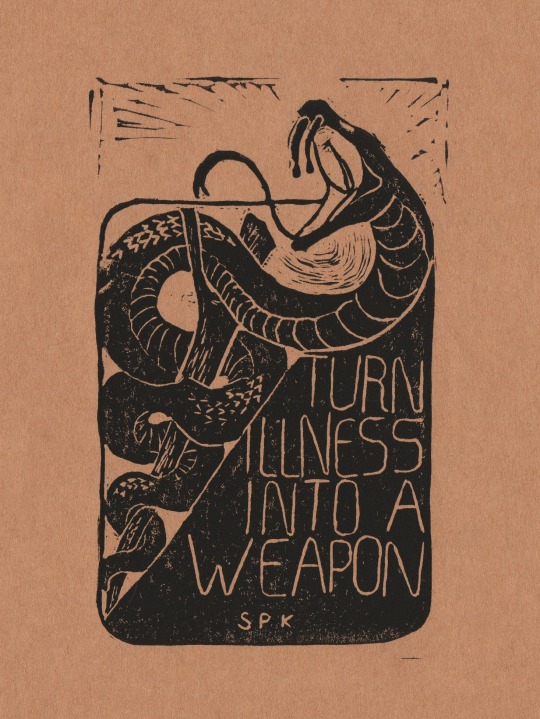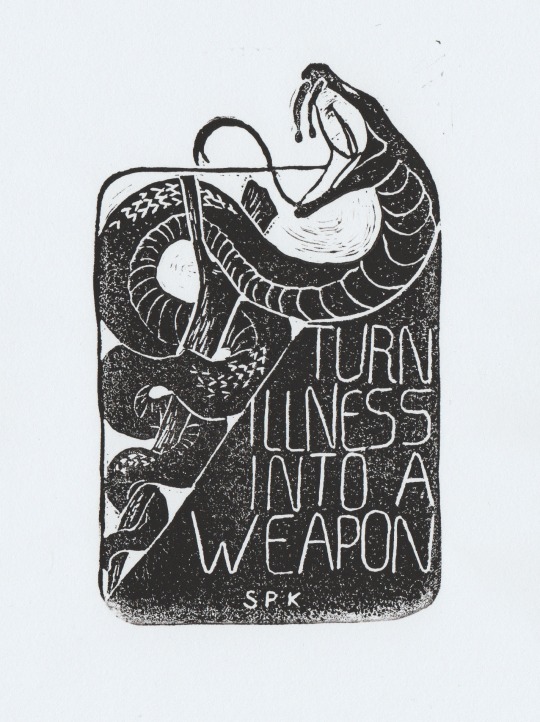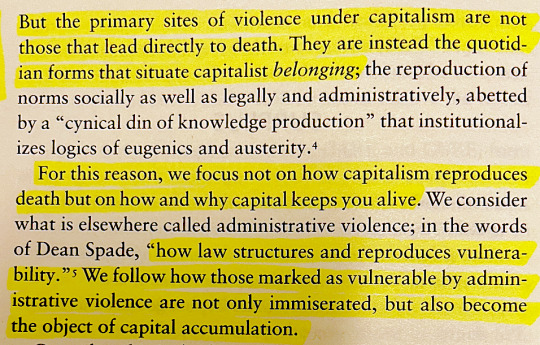#artie vierkant
Text


⚕️ Turn Illness into a Weapon ⚕️
"Among the surviving records of SPK’s (Sozialistisches Patientenkollektiv or Socialist Patients' Collective) actions and ideologies is a manifesto written by its members called Aus Der Krankheit Eine Waffe Machen (often translated as To Make an Army out of Illness, or Turn Illness into a Weapon). This 1972 text is part user manual, part oral history, part sardonic critique of Cold War capitalism. Unlike other self-organized patient groups and their counterparts in the anti-psychiatry movement, SPK uniquely combined Marxist political theory, social science analysis, and what they termed 'therapeutic praxis' to create an improvised, in-patient community with the express collectivist goal of researching the connections between capitalism, madness, eugenics, and the individuation of illness under political economies of work and care."¹
— from Health Communism, written by Beatrice Adler-Bolton and Artie Vierkant.
[ID: My design of a linocut print on brown paper. A snake is wrapped around a stick, with text below which reads, "Turn Illness into a Weapon". The snake is hissing and baring its fangs. Its tongue is curling out of its mouth. The second image is the same design but on white paper. End ID]
¹ Beatrice Adler-Bolton and Artie Vierkant, Health Communism (Brooklyn: Verso, 2022), 128-129.
#turn illness into a weapon#to make an army out of illness#Aus Der Krankheit Eine Waffe Machen#spk#Sozialistisches Patientenkollektiv#socialist patients' collective#illness#mental health#madness#disability justice#healthcare#political economy of health#health communism#beatrice adler-bolton#artie vierkant#death panel#snake#rod of asclepius#art#print making#ink#linocut#linoprint
156 notes
·
View notes
Text
Health under capitalism is an impossibility. Under capitalism, to attain health you must work, you must be productive and normative, and only then are you entitled to the health you can buy. This fantasy of individual health under the political-economic conditions of capitalism only ever exists as a state one cannot be, to which one must always strive.
Beatrice Adler-Bolton and Artie Vierkant, Health Communism
0 notes
Text
In capitalist political economies, illness is seen as a drag on productivity. Frequent or prolonged illness is often seen as disqualifying or devaluing an individual's labor power. There is a rush to be over with ill health and get back to work as quickly as possible. Rest is scarce, and all treatment under health-capitalism is rationed along class lines. The ways we encounter medicine reflect this dynamic: care is designed around billable encounters, acute care is the most easily accessible, and our cultural imaginary frames disease as something which is episodic. The provisioning of medical care and the social determinants of health have been based on a system of triage that attempts to devote maximum care resources to those most able to contribute productively to the economy.
Health Communism by Beatrice Adler-Bolton and Artie Vierkant
1K notes
·
View notes
Note
Do you listen to audio books, and if so, what are your favorites? thank you for the recommendations Sarah!
yes, I do!
some of my favorites to listen to on audio are:
fiction:
Becky Chambers, EVERYTHING, but here's the first book in her sublimely fantastic Wayfarers series.
Anthony, Veasna So, Afterparties
Courtney Summers, Sadie
Nnedi Okorafor, Who Fears Death
Ryka Aoki, Light from Uncommon Stars
Oyinkan Braithwaite, My Sister, The Serial Killer
Seanan McGuire, Every Heart a Doorway
Yaa Gyasi, Transcendent Kingdom
nonfiction:
Jeanette McCurdy, I'm Glad My Mom Died
Ruha Benjamin, Viral Justice
Beatrice Adler-Bolton, Artie Vierkant, Health Communism
Robin Wall Kimmerer, Braiding Sweetgrass
Harsha Walia, Border and Rule
there are many more where that came from, but that's a great list to get you started. listened to all of them on libby ofc!! <3
28 notes
·
View notes
Text
Currently Reading
Saving Our Own Lives by Shira Hassan (nonfiction) (reread)
Health Communism by Artie Vierkant and Beatrice Adler-Bolton (nonfiction)
Abolish the Family by Sophie Lewis (nonfiction)
Everything for Everyone by Eman Abdelhadi and M. E. O'Brien (fiction)
Obelisk Gate by NK Jemisin (fiction) (audiobook)
Navigation for Mobile
about
masterlist
storygraph
2 notes
·
View notes
Text
Accordingly, the idea that generosity and material comfort itself could act as a pathogen for "idleness" (and thus "fraud") is a way of framing those conditions, impairments, illness, or disabilities that could contribute to an individual's inability to work as a contagion in need of a "cure".
- "Health Communism" by Artie Vierkant
2 notes
·
View notes
Text
Hi, my lovelies! I'm still in the process of adding these to our Social Justice Resources but I just could not wait to share them!
Currently, the 2022 Socialism Conference is being hosted in Chicago, Illinois, as well as virtually, with lectures from a variety of diverse activists and authors, including but not limited to Robin D.G. Kelley, Ruth Wilson Gilmore, and Liat Ben-Moshe. I genuinely believe that these recordings could become such an amazing resource for my auditory learners, especially since a lot of our resources offered, including our own, are mainly text-based. (There is even a Q&A section provided at the end of each and just the representation in the room as well as the nuance in each and every person's words is truly astounding.)
The following lectures are offered, so please share them, listen while doing chores or driving, etc:
Crises, Wars, & Revolts on the Edge of a New Global Slump with David McNally & Shireen Akram-Boshar
Disability, Madness, Liberation: Deinstitutionalization & Prison Abolition with Liat Ben-Moshe
Transgender Marxism with Jules Joanne Gleeson, c, & Sophie Lewis
How Do We Get a New Constitution? with Aziz Rana & Amna Akbar
Pandemic Politics & the Viral Underclass with Steven Thrasher
Black Feminism & Black Liberation in 2022 with Barbara Ransby
Change Everything: Racial Capitalism & the Case for Abolition with Ruth Wilson Gilmore
Abolitionist Internationalism: Borders, Migration, & Racial Capitalism with Harsha Walia & Robin D.G. Kelley
Gaza is Palestine: Voices from Under the Blockade with Jehad Abusalim & Shafeka Hashash
Playing Through Fire: Sports In A Time Of Reaction with Dave Zirin
Rebuilding a New Reproductive Justice Movement: Taking on the Right with Anne Rumberger, Cheryl Rivera, Sarah Leonard, & Natalia Tylim
Health Communism: Toward a New Political Economy of Health with Beatrice Adler-Bolton & Artie Vierkant
The Dig LIVE: What Now? Perspectives on the Conjuncture, Daniel Denvir hosting Ruth Wilson Gilmore, Robin D.G. Kelley, & Olúfẹ́mi O. Táíwò
Class Struggle Unionism with Joe Burns
Freedom Dreams and the Socialist Project with Robin D.G. Kelley
Don't want to miss future activist-related events, protests, and workshops like this in the future? We offer free text message updates!
Signal boost because Tumblr kills posts with links. Love y'all!
-- @reaux07 (she/they)
#reaux speaks#socialism#conference#livestream#youtube video#abolition#disability justice#mad liberation#trans#marxism#communism#covid-19#womanism#intersectional feminism#palestine#anti capitalism#reproductive rights#unions#labor#robin dg kelley#ruth wilson gilmore#liat ben-moshe#anarchism#signal boost#free palestine#israel
38 notes
·
View notes
Text

[ID: But the primary sites of violence under capitalism are not those that lead directly to death. They are instead the quotidian forms that situate capitalist belonging; the reproduction of norms socially as well as legally and administratively, abetted by a "cynical din of knowledge production" that institutionalizes logics of eugenics and austerity. For this reason, we focus not on how capitalism reproduces death but on how and why capital keeps you alive. We consider what is elsewhere called administrative violence; in the words of Dean Spade, "how law structures and reproduces vulnerability." We follow how those marked as vulnerable by administrative violence are not only immiserated, but also become the object of capital accumulation. end ID]
from health communism by beatrice adler-bolton and artie vierkant
24 notes
·
View notes
Text
My list of Marxist/communist writings I’m reading or rereading:
Class Struggle in Africa by. Kwame Nkrumah;
An Anthropology of Marxism by. Cedric Robinson;
Decolonial Marxism by. Walter Rodney;
Golden Gulag by. Ruth Wilson Gilmore, and;
Health Communism by. Beatrice Adler-Bolton & Artie Vierkant
#kwame nkrumah#cedric robinson#communism#socialism#health communism#class struggle in Africa#golden gulag#Ruth Wilson Gilmore
4 notes
·
View notes
Text
Hyporealism Exhibition Text
Solo Exhibition
12.02.22 - 02.04.22
Stellenbosch
In Callan Grecia’s exhibition Hyporealism, he alters perceptions of what is ‘real’ (physical, tangible) by meticulously rendering the imaginary and two-dimensional. To say that Grecia’s paintings are anti-real, is not quite accurate… In fact, they pull the very real impacts of a digital reality into hyper-focus. His smooth finish, scale distortion, and flattened pictorial planes mimic the screen of a device; now an extension of the hand. His graphic paintings, enmeshed with internet iconography, act as an interface for understanding the systemic overlap between Neoliberalism and the Techno Age.
Grecia’s intrigue in the flat surface is a generational default. In 2003, when Callan was 12 years old and playing Theme Hospital, LCD computer monitors and flat-panel, slim-profile TVs (the ‘flat screen’) exceeded sales of CRT box televisions. The same year social media outlets MySpace and 4chan opened for public usage, followed by Google and Facebook (2004); Reddit (2005); Twitter (2006); Tumblr (2007); 9GAG (2008); Pinterest and Instagram (2010)… and TikTok (2017) which popularised in 2020 in the midst of global lockdowns. The invention of social platforms perfectly aligned with the rapid advancement of mobile phones, from Nokia’s iconic ‘3310’ (2003) to the invention of iPhone (2007). In 2021, Samsung launched ‘The Frame’, a customisable wooden-framed “TV when it’s on. Art when it’s off” with a gallery of designed visages for you to display, as if paintings on a wall, at home in your TV’s downtime. This creation is as indistinguishable from the digital uptake of NFTs which have permeated ‘the art world’, as Grecia’s style is a response to his view of the world being digitally dominated. His experience of life spans this technological evolution and the cultural, consumerist, socio-economic, and political whirlwind which follows.
“I don’t use texture for the sake of texture,” Grecia explains, particularly when he draws from the web’s visual lexicon as many Post-Internet artists do. “What makes a painting a painting?” He questions. Or, rather, what makes a painting beckoning? What do we want from a painting? Is it, as Viktor Shklovsky claims in Art as Technique, “to impart the sensation of things as they are perceived and not as they are known.” The reality is that even the more painterly painting or textile is indirectly influenced by technology; often beginning with the use of a projector or screen for direct tracing or image mapping. A process which is hidden behind materiality and the illusion of physicality: ‘reality’.
As post-internet theorist Artie Vierkant suggests: we are in an age where attention is currency. Grecia’s adaptation of pop culture is a device used to draw us into the image. He invites the viewer to scan these collaged planes for familiar symbols to relate to, some contemporary and others nostalgic. This iconography includes a masked figure resembling fictional serial killer Jason Voorhees from Friday the 13th; a cat sculpture with a side profile that conjures the Pokémon Lapras; Henri Matisse’s bold outlines and Picasso’s angular figures in Les Demoiselles d’Avignon; Virgil Abloh’s Off White logo; Adidas’ three-stripes; Nike’s tick; and designer Thomas Heatherwick’s Spun stools which function as interactive public sculptures at the entrance of Zeitz MoCAA, repurposed by Grecia as cosmic garb vis-à-vis dadaist Hugo Ball at Cabaret Voltaire.
Of particular interest is Grecia’s returning reference to helio statues. Now classified as a ‘dead meme’ the marble bust of classical antiquity was once a mascot of the Vaporwave a e s t h e t i c; the first of its kind to be made by and for an internet audience. Vaporwave was a future-focused micro-genre made up of glitchy electronic music; 1980’s neon graphic design; and geometric digital art. It emerged in the early 2010s as a satirical response to consumer capitalism and pop culture. Much like Grecia’s practice, it was predicated on nostalgic imagery and populism. The alabaster greco bust has many associations: from being the height of artistic mastery and a main collector’s item for powerful and wealthy European families; to being the symbol of Enlightenment ideals; a propagandist totem of insipid white eurocentricity for the 1936 Olympic Games in Nazi Germany; to a protest symbol for iconoclasm, deformation and transformation. However, much like plaster-cast greco statues in a middle-class garden, the Vaporwave movement quickly edged toward the kitsch not long after it was established as a niche subculture.
As Grecia explains, "there is nothing new [in thinking, in image-making], only conditions affected by a networked way of life.” His repetitive use of symbols in Hyporealism speaks to the ubiquity of imagery in our post-internet reality, where the transferral of images across networks is lead by Neoliberalism: consumption and capitalism.
Text by Lindsey Raymond*
0 notes
Text
Health under capitalism is an impossibility. Under capitalism, to attain health you must work, you must be productive and normative, and only then are you entitled to the health you can buy. This fantasy of individual health under political-economic conditions of capitalism only ever exists as a state one cannot be, to which one must always strive.
Beatrice Adler-Bolton and Artie Vierkant, Health Communism (Brooklyn: Verso, 2022), xi.
6 notes
·
View notes
Video
youtube
Liked on YouTube: Fear of Trans Bodies || https://www.youtube.com/watch?v=Yt2QPnhqIuI || Get a year of Nebula + Curiosity Stream for under $12 (42% off): https://ift.tt/yu7Dmns Watch this video ad-free on Nebula: https://ift.tt/aksDNAQ - What does it mean for a body to be damaged? - Support the channel on Patreon: https://ift.tt/8ubzfXm Twitter: https://twitter.com/lily_lxndr Letterboxd: https://ift.tt/mbqnyrZ Instagram: https://ift.tt/PQZOWV5 - References 1. “On the Outside Looking In” by Julia Serano: https://ift.tt/GR0D1IC 2. “Irreversible Damage” by Abigail Shrier: 3. “Tracing the Roots of Pop Culture Transphobia” by Lindsay Ellis: https://www.youtube.com/watch?v=cHTMidTLO60 4. Breast cancer risk in transgender people receiving hormone treatment: nationwide cohort study in the Netherlands https://ift.tt/YGoeaQZ 5. “What’s so Good about Being Natural?” by Nour Abi-Nakhoul: 6. Hormone Replacement Therapy Market Worth $35.79 Billion by 2030: https://ift.tt/ONbmX94 7. Global Anti Aging Market Size Worth $120 Billion by 2030 at a 7.5% CAGR: https://ift.tt/wmaVSlN 8. Female voice changes around and after the menopause--an initial investigation: https://ift.tt/TCZc4tv 9. “Ten Stages of Genocide” by Gregory H. Stanton: https://ift.tt/LFT7uC0 Media used “It Was Hot, We Stayed in the Water (STEMS Version)” by The Microphones “Transphobic Techno (B**** Got a P****)” by Your Favorite Martian “Back to the Future” by Robert Zemeckis Several videos by TT Exulansic “I Emailed my Doctor 133 Times - The Crisis in the British Healthcare System” by Philosophy Tube Twitter vent by KC Miller “Network” by Sidney Lumet “Synecdoche, New York” by Charlie Kaufman “RaeLynn - God Made Girls” by TK McKamy “The Final Exit of the Disciples of Ascensia” by Jonni Phillips Backxwash live set - M for Montreal 2021 “The Queen” by Frank Simon Inspirations “Health Communism” by Beatrice Adler-Bolton and Artie Vierkant “My Words to Victor Frankenstein Above the Village of Chamounix” by Susan Stryker “Should Have Known Better” by Sufjan Stevens Everything ever released by The Microphones & Mount Eerie “There is no other world, and there has never been.” Correction: 33:31 The sale actually ends January 2nd, 2023. After that, my link gives a smaller discount.
0 notes
Text
While the surplus population does contain those who are disabled, impaired, sick, mad, or chronically ill, the characteristic vulnerability of the surplus is not inherent to their existence — that is, it is not any illness, disability, or pathologized characteristic that itself makes the surplus vulnerable. Their vulnerability is instead constructed by the operations of the capitalist state.
... [Those] deemed to be surplus are rendered excess by the systems of capitalist production and have been consequently framed as a drain or a burden on society. But the surplus population has become an essential component of capitalist society, with many industries built on the maintenance, supervision, surveillance, policing, data extraction, confinement, study, cure, measurement, treatment, extermination, housing, transportation, and care of the surplus. In this way, those discarded as non-valuable life are maintained as a source of extraction and profit for capital.
Health Communism by Beatrice Adler-Bolton and Artie Vierkant
302 notes
·
View notes
Text
Photographers Today
Ryan Foerster (b. Newmarket, Canada, 1983. Lives and works in New York.)
Lucas Blalock (b. 1978, Asheville, NC. Lives and works in New York.)
Artie Vierkant (b. 1986, Breinerd, MN. Lives and works in New York.)
Martine Syms (b. 1988, Los Angeles. Lives and works in LA.)
Joshua Citarella (b. 1987 New York. Lives and works in New York.)
Sara Cwynar (b. 1985, Ottawa. Lives and works in New…
View On WordPress
Foma200@200 with HC110 dilution H plus 2ml of Rodinal, 16’30” agitation every minute
I mix Ansco 130 with either potassium or sodium carbonate to obtain slightly cooler or warmer tones. I also use 1% benzotrizole solution to slightly modify tones.
0 notes
Note
1 & 2 for the reading asks? 📚
What are 2-5 already published fiction books you think you want to read in 2023?
Here are 5 more from my gotta-read list!: Dora M. Raymaker, Hoshi and the Red City Circuit, Lydia Yuknavitch, The Book of Joan, Seth Dickinson, The Traitor Baru Cormorant, Lucy Corin, One Hundred Apocalypses and Other Apocalypses, Fannie Flagg, Fried Green Tomatoes at the Whistle Stop Cafe.
What are 2-5 already published nonfiction books you think you want to read in 2023?
Annnnnnd 5 more NF: Sami Schalk, Black Disability Politics, Walter Benjamin, The Arcades Project, Beatrice Adler-Bolton and Artie Vierkant, Health Communism, Alison Jane, Meander, Spiral, Explode, Tillie Walden, Spinning.
12 notes
·
View notes
Text
Death Panel is a good podcast
It's loosely organized around the ideas laid out in the hosts' recent book, Health Communism.
0 notes